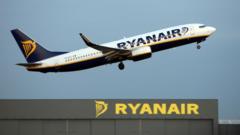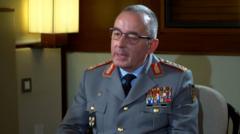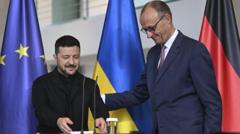This piece discusses the warm reception Merz received during his Oval Office visit and the potential implications for US-German relations under his leadership.
Chancellor Merz's Diplomatic Debut: Bridging Divides with Trump

Chancellor Merz's Diplomatic Debut: Bridging Divides with Trump
In his first meeting with President Trump, Chancellor Friedrich Merz of Germany aims to reshape diplomatic relations, including those with Russia.
In a highly anticipated meeting on Thursday, President Trump welcomed Germany's newly appointed Chancellor Friedrich Merz to the Oval Office, marking a significant moment in transatlantic relations. Known for his often combative interactions with foreign leaders, Trump appeared amicable during this encounter, emphasizing a desire to strengthen ties with Germany, particularly in contrast to his previous critiques of German policies and leaders.
Chancellor Merz, a distinguished business figure and proficient English speaker, brought along a thoughtful gift for Trump — a copy of the president's grandfather's German birth certificate. This gesture resonated with Trump, who expressed his admiration and indicated that he would display it prominently. Their initial rapport was evident, and Trump's remarks about the Oval Office, which he stated was in "very good shape," drew parallels to his visions of German efficiency and aesthetics.
The atmosphere during the meeting suggested that Merz passed the unofficial "test" of diplomacy with Trump, who has sometimes been hostile toward other European leaders. The session points to Merz's potential role in recalibrating German-American relations, especially as the tensions with Russia loom larger in global politics. This meeting could set the tone for future collaboration as they navigate complex issues ranging from international security to economic cooperation.
Although the meeting's extent was largely ceremonial, the underlying undertones hinted at an eagerness from Merz to foster a constructive dialogue with the US. By establishing a friendly relationship with Trump, he hopes to pave the way for significant policy discussions. The meeting raises optimistic expectations about how the new German chancellor will navigate the intricate landscape of international relations, pairing his diplomatic efforts with tangible outcomes in the ongoing complexities of foreign policy.
Chancellor Merz, a distinguished business figure and proficient English speaker, brought along a thoughtful gift for Trump — a copy of the president's grandfather's German birth certificate. This gesture resonated with Trump, who expressed his admiration and indicated that he would display it prominently. Their initial rapport was evident, and Trump's remarks about the Oval Office, which he stated was in "very good shape," drew parallels to his visions of German efficiency and aesthetics.
The atmosphere during the meeting suggested that Merz passed the unofficial "test" of diplomacy with Trump, who has sometimes been hostile toward other European leaders. The session points to Merz's potential role in recalibrating German-American relations, especially as the tensions with Russia loom larger in global politics. This meeting could set the tone for future collaboration as they navigate complex issues ranging from international security to economic cooperation.
Although the meeting's extent was largely ceremonial, the underlying undertones hinted at an eagerness from Merz to foster a constructive dialogue with the US. By establishing a friendly relationship with Trump, he hopes to pave the way for significant policy discussions. The meeting raises optimistic expectations about how the new German chancellor will navigate the intricate landscape of international relations, pairing his diplomatic efforts with tangible outcomes in the ongoing complexities of foreign policy.






















